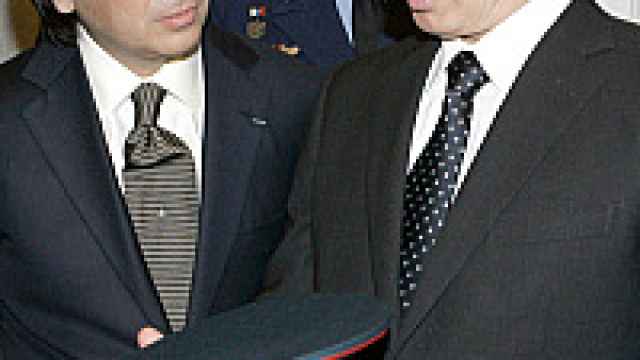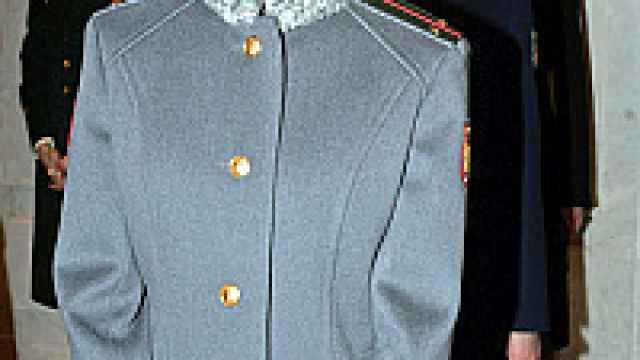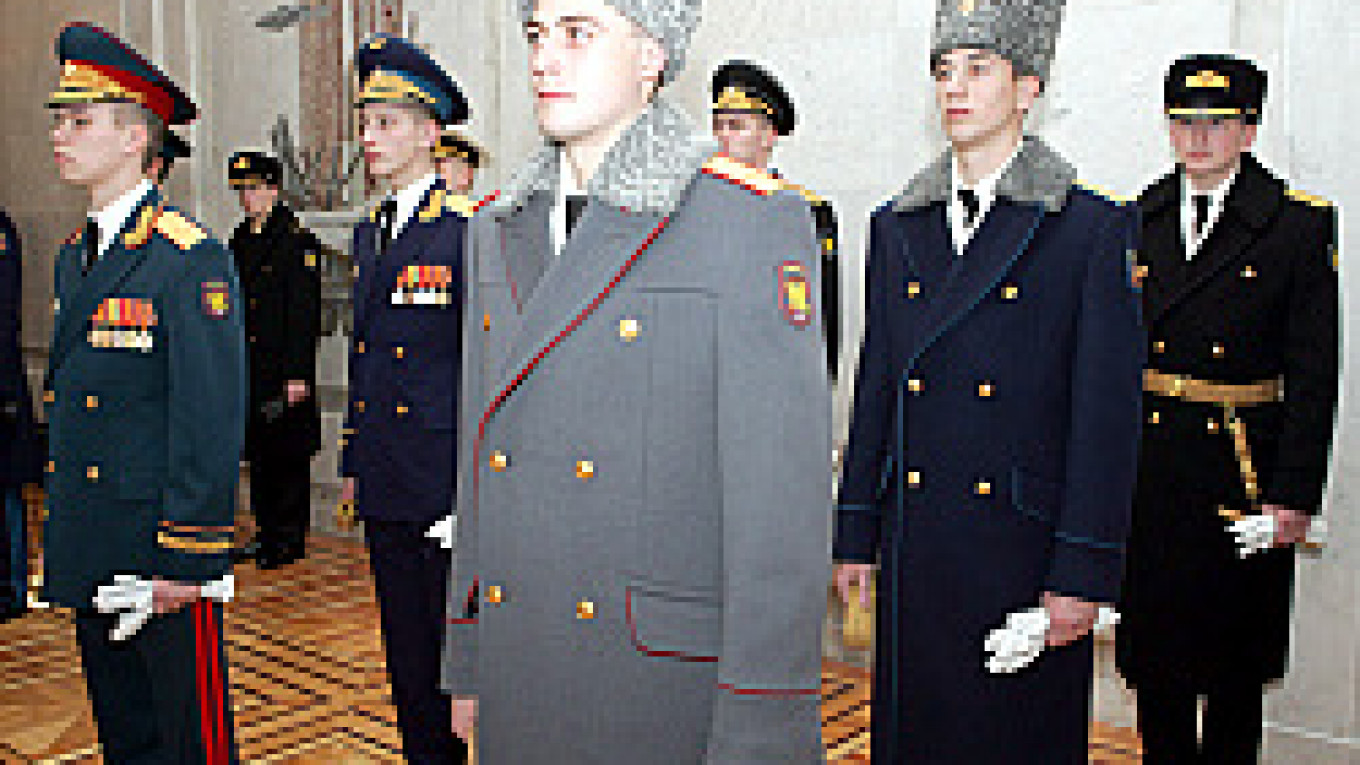The Defense Ministry last week unveiled the results of a half-year project to develop new military uniforms, the most sweeping redesign since a 1990s makeover that prompted widespread criticism from soldiers and officers.
President Vladimir Putin was the guest of honor at a fashion show hosted by Deputy Defense Minister Vladimir Isakov and one of Russia's best-known designers, Valentin Yudashkin, who won a tender to design the new uniforms.
While television crews seemed most interested in the frills -- especially the lambskin collar and beret worn by a slender female model -- the biggest news for soldiers may be in the footwear department.
The Defense Ministry is phasing out portyanki, the footcloths that Russian soldiers have wrapped their feet with since the days of Peter the Great, and replacing them with socks. Officials are also replacing sapogi, or traditional Russian army boots, with lace-up boots similar to those worn in the U.S. army.
 AP Putin looking over a service cap design with Yudashkin at the presentation. | |
Yudashkin's redesign undoes one of the least popular changes introduced in 1994 under then-Defense Minister Pavel Grachyov: the peaked caps that were raised to towering heights to accommodate a two-headed-eagle insignia.
"Those utterly shameful caps need to be taken away or minimized," Vorobyov said. "It is simply impossible to walk around in them when there is a strong wind, since they get blown away."
Innovations include white dress uniforms for Navy officers -- a revival of a pre-1994 style -- and blue ones for Air Force officers, who currently wear a drab olive. Air Force pilots get U.S.-style bomber jackets made of leather with fur collars.
Perhaps the most elaborate design is a new uniform for the presidential honor guard that features dark blue and red fabric, highlighted by gold buttons and epaulets reminiscent of the tsarist army.
 Vladimir Rodionov / Itar-Tass This women's winter uniform option comes with lambskin beret and collar. | |
The redesign project was launched last year by Defense Minister Anatoly Serdyukov, a former furniture store manager, several months after his appointment in February 2007. In an unusual case of the military reaching out to the world of haute couture, Serdyukov invited some of Russia's top fashion designers to compete in the tender, including Yudashkin and Igor Chapurin.
The resulting designs will be scrutinized by each branch of the military over the next six to nine months, and it will take three years to produce new uniforms for everyone in the armed forces, Isakov said.
Putin made no public remarks at last week's presentation, but he apparently gave his approval. "The president had no criticisms," Yudashkin told reporters.
Not everyone was so neutral. Alexander Prokhanov, editor of the nationalist newspaper Zavtra, blasted Yudashkin and called the new uniforms effeminate. "When the Russian infantry attacks, they will look like a swarm of butterflies," Prokhanov said in an interview with Ekho Moskvy radio.
Visitors to the popular blogging site LiveJournal.com wondered why the government was designing new uniforms when the military faced an array of other problems.
"It would have been better if they had raised pensions or increased benefits for children," wrote one user. "Instead they sew uniforms and build stadiums."
A Message from The Moscow Times:
Dear readers,
We are facing unprecedented challenges. Russia's Prosecutor General's Office has designated The Moscow Times as an "undesirable" organization, criminalizing our work and putting our staff at risk of prosecution. This follows our earlier unjust labeling as a "foreign agent."
These actions are direct attempts to silence independent journalism in Russia. The authorities claim our work "discredits the decisions of the Russian leadership." We see things differently: we strive to provide accurate, unbiased reporting on Russia.
We, the journalists of The Moscow Times, refuse to be silenced. But to continue our work, we need your help.
Your support, no matter how small, makes a world of difference. If you can, please support us monthly starting from just $2. It's quick to set up, and every contribution makes a significant impact.
By supporting The Moscow Times, you're defending open, independent journalism in the face of repression. Thank you for standing with us.
Remind me later.


